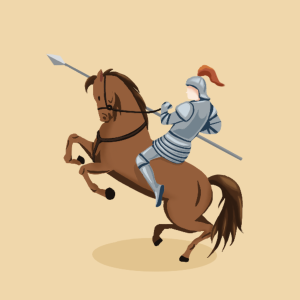
Tuesday Aug 22, 2023
The Ingenious Knight: Don Quixote’s Quest for Chivalry
Chapter 1:Who is Don Quixote
Don Quixote, also known as "The Ingenious Gentleman Don Quixote of La Mancha," is a fictional character created by Spanish author Miguel de Cervantes. He is the protagonist of the novel "Don Quixote," considered one of the most important works of literature ever written.
Don Quixote is depicted as an elderly gentleman from the region of La Mancha in central Spain. Inspired by stories of chivalry and knights-errant that he has read excessively, he becomes convinced that he is a knight himself and sets out on various adventures to uphold justice and defend the helpless.
Though his intentions are noble, Don Quixote's perception of reality becomes distorted, leading to comical situations. He imagines windmills as giants to be fought, inns as castles, and commoners as noble figures. Despite the ridicule and lack of recognition from others, Don Quixote remains steadfast in his belief of being a knight errant and displays unwavering courage and idealism.
Through the character of Don Quixote, Cervantes explores themes such as the power of imagination, the clash between fantasy and reality, and the nature of heroism. Don Quixote's journey serves as a satirical commentary on the romanticized ideals of chivalry and the human desire for heroic adventures.
The character of Don Quixote has had a lasting impact on literature and popular culture. His name has become synonymous with idealism, delusion, and the pursuit of impossible dreams. "Don Quixote" continues to be widely read and studied, and its influence can be seen in subsequent works of fiction, theater, and art.
Chapter 2:How does the Don Quixote end
The ending of "Don Quixote" is bittersweet. In the novel, Don Quixote eventually returns to his hometown of La Mancha after a series of misadventures and encounters with various characters. His friend and loyal squire, Sancho Panza, accompanies him.
Upon their return, Don Quixote falls ill and believes that he needs to renounce his chivalric ideals in order to be cured. He regains his sanity and realizes that his previous adventures were nothing more than delusions. Don Quixote then dictates his will, acknowledging his madness and expressing remorse for his actions.
Shortly after, Don Quixote passes away, surrounded by friends and loved ones. The novel ends with Cervantes referring to a sequel that was published by another author, suggesting that the story lives on even beyond the pages of the book.
The ending of "Don Quixote" can be interpreted as a reflection on the power of imagination and the consequences of pursuing unrealistic dreams. It also speaks to the transient nature of idealism and the ultimate reality that one must face.
Overall, the ending conveys a sense of resignation and acceptance but leaves a lingering impact as readers reflect on the complex character of Don Quixote and the profound themes explored throughout the novel.
Chapter 3:Books like Don Quixote
-
"Tristram Shandy" by Laurence Sterne: This novel, published in the 18th century, is known for its experimental narrative style and satirical tone. Like "Don Quixote," it humorously critiques various aspects of society and explores the complexities of human nature.
-
"Gulliver's Travels" by Jonathan Swift: Swift's satirical novel follows the adventures of Lemuel Gulliver as he encounters various societies and cultures. It shares similarities with "Don Quixote" in terms of social criticism and the exploration of fantastical elements.
-
"The Life and Opinions of Tristram Shandy, Gentleman" by Miguel de Unamuno: This Spanish novel pays tribute to Sterne's "Tristram Shandy" while adding its own layers of metafiction and philosophical musings. It reflects on the nature of storytelling and the complex relationship between author, narrator, and reader.
-
"Quichotte" by Salman Rushdie: This modern retelling of "Don Quixote" by Nobel Prize-winning author Salman Rushdie captures the essence of Cervantes' work in a contemporary context. It explores themes of identity, disillusionment, and the power of storytelling.
-
"The Ingenious Language" by David Bellos: While not a fictional work, this book delves into the linguistic and cultural impact of "Don Quixote" throughout history. It provides insights into Cervantes' masterpiece and its enduring legacy.
No comments yet. Be the first to say something!